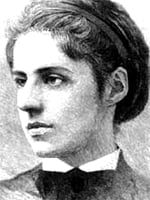From “An Epistle”
From Joshua Ibn Vives of Allorqui to his former master, Solomon Levi-Paul, de Santa-Maria, Bishop of Cartagena, Chancellor of Castile, and privy councillor to King Henry III of Spain.
I.
Master and Sage, greetings and health to thee,
From thy most meek disciple! Deign once more
Endure me at thy feet, enlighten me,
As when upon my boyish head of yore,
Midst the rapt circle gathered round thy knee
Thy sacred vials of learning thou didst pour.
By the lage lustre of thy wisdom orbed
Be my black doubts illumined and absorbed.
II.
Oft I recall that golden time when thou,
Born for no second station, heldst with us
The Rabbi’s chair, who are priest and bishop now;
And we, the youth of Israel, curious,
Hung on thy counsels, lifted reverent brow
Unto thy sanctity, would fain discuss
With thee our Talmud problems good and evil,
Till startled by the risen stars o’er Seville.
III.
For on the Synagogue’s high-pillard porch
Thou didst hold session, till the sudden sun
Beyond day’s purple limit dropped his torch.
Then we, as dreamers, woke, to find outrun
Time’s rapid sands. The flame that may not scorch,
Our hearts caught from thine eyes, thou Shining One.
I scent not yet sweet lemon-groves in flower,
But I re-breathe the peace of that deep hour.
IV.
We kissed the sacred borders of thy gown,
Brow-aureoled with thy blessing, we went forth
Through the hushed byways of the twilight town.
Then in all life but one thing seemed of worth,
To seek, find, love the Truth. She set her crown
Upon thy head, our Master, at thy birth;
She bade thy lips drop honey, fired thine eyes
With the unclouded glow of sun-steeped skies.
V.
Forgive me, if I dwell on that which, viewed
From thy new vantage-ground, must seem a mist
Of error, by auroral youth endued
With alien lustre. Still in me subsist
Those reeking vapors; faith and gratitude
Still lead me to the hand my boy-lips kissed
For benison and guidance. Not in wrath,
Master, but in wise patience, point my path.
VI.
For I, thy servant, gather in one sheaf
The venomed shafts of slander, which thy word
Shall shrivel to small dust. If haply grief,
Or momentary pain, I deal, my Lord
Blame not thy servant’s zeal, nor be thou deaf
Unto my soul’s blind cry for light. Accord—
Pitying my love, if too superb to care
For hate-soiled name—an answer to my prayer.
This poem is in the public domain. Published in Poem-a-Day on March 2, 2024, by the Academy of American Poets.
“An Epistle” appears in The Poems of Emma Lazarus in Two Volumes, Vol. II, Jewish Poems: Translations, published in 1889 by The Riverside Press. Lazarus provided a brief headnote stating, “In this poem, I have done little more than elaborate and versify the account given in [Heinrich] Graetz’s History of the Jews (Vol. VIII., page 77), of an Epistle actually written in the beginning of the fifteenth century by Joshua ben Joseph ibn Vives to Paulus de Santa Maria.” In “Emotion and the Jewish Historical Poems of Emma Lazarus,” scholar and professor of English Gregory Eiselein expounded on this persona poem by first asserting that “[i]n the poem’s headnote, [Lazarus] states that she is merely rendering a fifteenth-century letter into poetry. Yet her act of historical recovery expands and translates [Joshua ben Joseph ibn Vives]’s prose into thirty-four eight-line stanzas of English rhymed abababcc. In this letter to a former rabbi … [t]he student’s tone is deferential, but the letter critiques the conversion, the motivations behind it, the false justifications of it, and the hypocrisy it signifies. To highlight the letter’s irony, Lazarus turns to ottava rima.”

